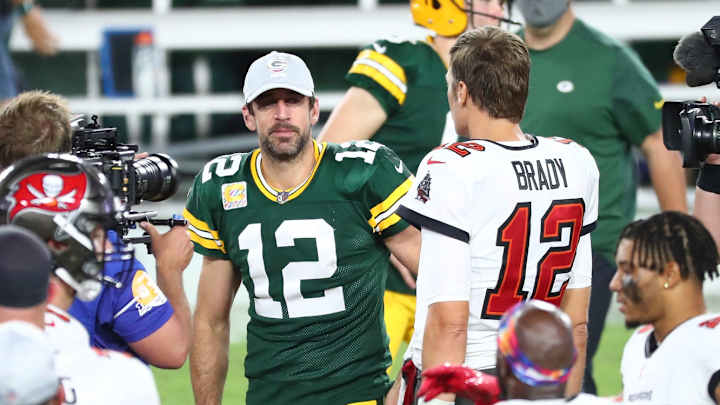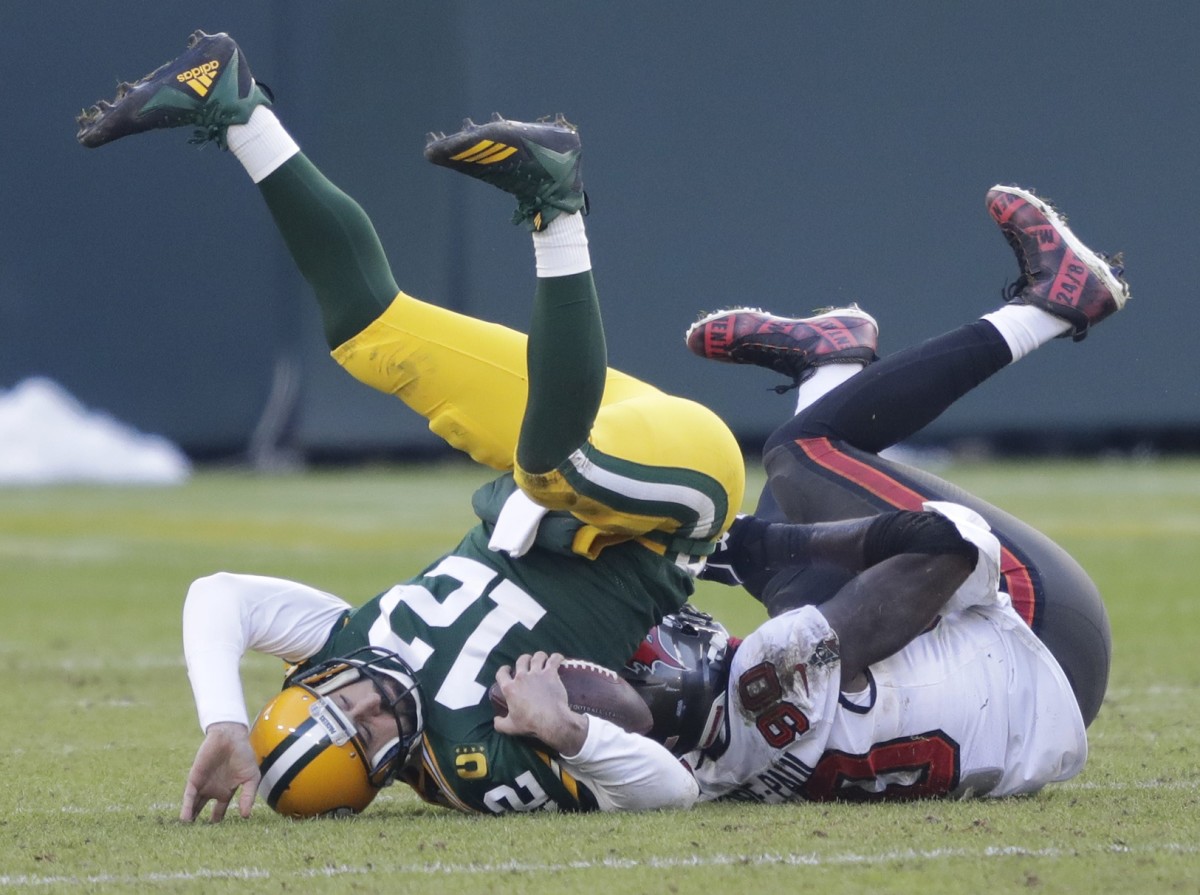Aaron Rodgers Has the Stats, but Tom Brady Has the Big Win

The NFC Championship game was a microcosm of the Aaron Rodgers-Tom Brady debate.
Former Cal star Rodgers had the better individual passing statistics, but Brady had the big win.
With Brady's Tampa Bay Buccaneers defeating Rodgers' Green Bay Packers 31-26 on Sunday afternoon in Green Bay, Brady improved his record in conference championship games to 10-4, while Rodgers' record in conference title games dropped to 1-4.
Rodgers has had the two best seasons in NFL history in terms of passer rating, including the second best mark alltime this season. Rodgers also has the best career passer rating in history among quarterbacks who have played more than four seasons.
But it matters little that Rodgers' numbers on Sunday -- 33-for-48 for 346 yards, three touchdowns, one interception and a 101.6 passer rating -- were better than Brady's -- 20-for-36, 280 yards, three touchdowns, three interceptions and a 73.9 passer rating.
What matters is that Brady will have a chance to get his seventh Super Bowl ring, while Rodgers will not get a shot at his second. And Brady's chance will come on his home field at Raymond James Stadium in Tampa, Fla., the first time a team will play a Super Bowl game at his home stadium.
Here is Rodgers' first touchdown pass Sunday:
5️⃣0️⃣ yards to @MVS__11!
— Green Bay Packers (@packers) January 24, 2021
TOUCHDOWN! 🙌#TBvsGB | #GoPackGo
📺 FOX
Watch live 📱 https://t.co/hXyIKW8GE0 https://t.co/SP71SKnc5y
Rodgers was trying to put a former Cal quarterback in the Super Bowl for the seventh time as a starter. Rodgers is the only Cal alum who has won a Super Bowl as a starting quarterback, turning the trick in the 2010 season, while Joe Kapp (Vikings, 1969 season), Craig Morton (Cowboys in 1970, Broncos in 1977), Vince Ferragamo (Rams 1979) and Jared Goff (Rams in 2018) all lost in the ultimate game.
Rodgers fell just short of getting a shot at his second, because the Bucs have been kryptonite for Rodgers.
Rodgers is virtually assured of being named the league MVP this season, but he might not be in line for that award if the Packers had to face Brady and the Buccaneers every week.
Rodgers threw six interceptions the entire season, including two playoff games, and three of them came against the Bucs, who beat the Packers 38-10 during the regular season. Rodgers was sacked just 25 times all season in 16 regular-season games and two postseason games, but nine of those sacks came against the Bucs, who sacked Rodgers five times Sunday.

Sunday's game essentially came down to two critical plays and one controversial decision by Packers coach Matt LaFleur.
The two key plays came in a span of five plays that bridged halftime.
The first was Brady's 39-yard touchdown pass to Scotty Miller on a play that began with eight seconds left in the half and Tampa Bay having no timeouts. Somehow Green Bay allowed Miller to get behind its back line on a play when it was absolutely essential that no receiver get behind the defense.
Here is that inexplicable play:
ARE YOU KIDDING ME, SCOOTER?! 😱
— Tampa Bay Buccaneers (@Buccaneers) January 24, 2021
📺: https://t.co/RwWO3c7TxT pic.twitter.com/U6gzxyy6bU
The second big play was the third play from scrimmage of the second half, when Packers running back Aaron Jones fumbled, giving Tampa Bay the ball at the Green Bay 8-yard line. The Bucs and Brady immediately turned it into a touchdown, and suddenly it was 28-10 just a few plays after it was 14-10.
Rodgers rallied the Packers to put them in position to tie the game, throwing this touchdown pass to Davante Adams with 24 seconds left in the third quarter to make it a 28-23 Bucs lead.
Here is that TD pass:
5️⃣0️⃣ yards to @MVS__11!
— Green Bay Packers (@packers) January 24, 2021
TOUCHDOWN! 🙌#TBvsGB | #GoPackGo
📺 FOX
Watch live 📱 https://t.co/hXyIKW8GE0 https://t.co/SP71SKnc5y
A debatable decision to go for two points, which failed, made the margin five rather than four.
After a Tampa Bay field goal boosted the lead to eight points, Rodgers led a drive that gave Green Bay a first down at the Tampa Bay 8-yard line.
After three consecutive incompletions -- and Rodgers might have scored if he had run on third down -- the Packers faced a fourth down from the Tampa Bay 8-yard line with 2:09 left.
That's when Packers head coach Matt LaFleur made his controversial decision, opting to kick a field goal, cutting the deficit to five, rather than go for a touchdown, which, along with a two-point conversion, would have tied the game.
Rodgers said in his postgame interview (below) that he would have called a different play on third down if he had known the Packers were not going to go for a touchdown on fourth down, implying that he was surprised by LaFleur's decision to kick a field goal.
But the Packers never got the ball back, and Rodgers' chance to get to his second Super Bowl ended with him sitting on the bench, watching Mason Crosby kick a 26-yard field goal, then watching Brady and the Bucs run out the clock.
.
Follow Jake Curtis of Cal Sports Report on Twitter: @jakecurtis53
Find Cal Sports Report on Facebook by searching: @si.calsportsreport
